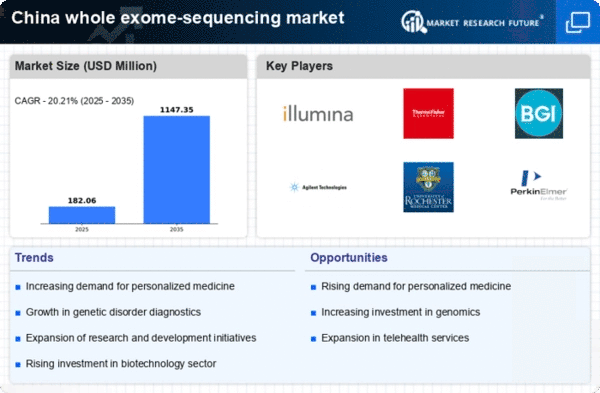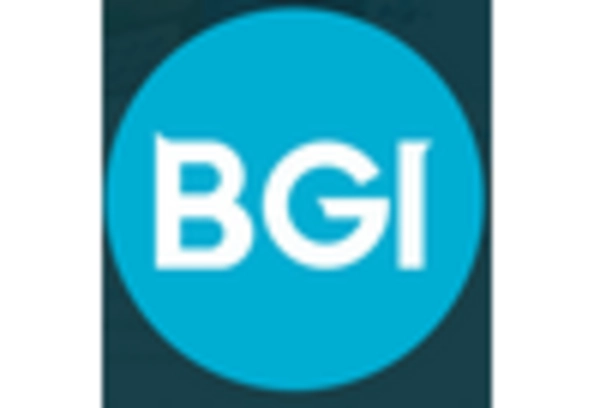Supportive Regulatory Framework
The regulatory environment in China is becoming increasingly supportive of genomic technologies, which is beneficial for the whole exome-sequencing market. Recent policy changes have streamlined the approval processes for genetic testing and sequencing technologies, making it easier for companies to bring their products to market. In 2025, it is anticipated that the regulatory framework will continue to evolve, with new guidelines aimed at ensuring the safety and efficacy of genomic tests. This supportive regulatory landscape is likely to encourage innovation and investment in the whole exome-sequencing market, as companies will have clearer pathways to compliance. As regulations become more favorable, the market is expected to expand, facilitating the adoption of whole exome sequencing in clinical and research settings.
Rising Awareness of Precision Medicine
There is a growing awareness of precision medicine among healthcare professionals and patients in China, which is significantly influencing the whole exome-sequencing market. As more individuals seek personalized treatment options, the demand for genomic testing is increasing. In 2025, it is estimated that the market for precision medicine will expand by 30%, driven by the need for tailored therapies based on genetic profiles. This shift towards precision medicine is encouraging healthcare providers to incorporate whole exome sequencing into their diagnostic processes, as it provides critical insights into individual genetic makeup. The increasing emphasis on personalized healthcare solutions is likely to sustain the growth of the whole exome-sequencing market, as it aligns with the broader trend of individualized patient care.
Growing Prevalence of Genetic Disorders
The rising incidence of genetic disorders in China is a significant driver for the whole exome-sequencing market. With an estimated 1 in 10 individuals affected by some form of genetic condition, the demand for effective diagnostic tools is increasing. Whole exome sequencing offers a comprehensive approach to identifying genetic mutations, making it a preferred choice for clinicians. In 2025, it is projected that the market for genetic testing will grow by approximately 15%, driven by the need for accurate and timely diagnoses. This growing prevalence of genetic disorders is prompting healthcare providers to adopt whole exome sequencing as a standard practice, thereby expanding its application in clinical settings. As awareness of genetic disorders increases, the whole exome-sequencing market is likely to see sustained growth in demand.
Advancements in Bioinformatics Solutions
The whole exome-sequencing market is being propelled by advancements in bioinformatics solutions that enhance data analysis and interpretation. In recent years, the development of sophisticated software tools has improved the ability to analyze complex genomic data, making it more accessible for researchers and clinicians. In 2025, the bioinformatics market in China is expected to grow by 25%, reflecting the increasing reliance on data-driven approaches in genomics. These advancements enable more accurate identification of genetic variants, which is crucial for the effective application of whole exome sequencing in clinical diagnostics. As bioinformatics continues to evolve, it is likely to play a pivotal role in the growth of the whole exome-sequencing market, facilitating the integration of genomic data into routine clinical practice.
Increasing Investment in Genomic Research
The whole exome-sequencing market in China is experiencing a surge in investment from both public and private sectors. Government initiatives aimed at enhancing genomic research funding have led to a notable increase in financial resources allocated to this field. In 2025, the Chinese government announced a budget increase of approximately 20% for genomic research, which is expected to bolster the development of whole exome sequencing technologies. This influx of capital is likely to facilitate advancements in sequencing technologies, thereby enhancing the capabilities of laboratories and research institutions. Furthermore, private companies are also investing heavily in this market, with estimates suggesting that investments could reach $1 billion by 2026. This trend indicates a robust commitment to advancing genomic research, which is crucial for the growth of the whole exome-sequencing market.

















